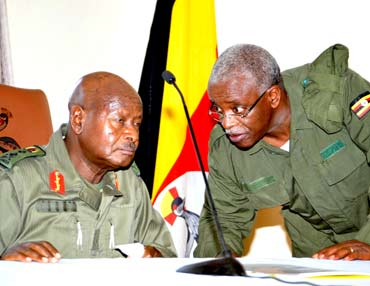Analysis
Mbabazi; the hunter being hunted

Museveni and Mbabazi
But the usually composed and sometimes aloof Prime Minister has been overtaken by anxiety and desperation in recent days forcing him to run to the media in an apparent effort to clear the air and seek public sympathy.
During a recent political talk show, Mbabazi went as far as noting that his Luganda accent was not very good but promised he would work hard to ensure that he improves on the language so as to be able to express himself in a language understood by the majority .
This to some observers reflected a sense of desperation that the once revered ‘Mr. Clean’ is getting caught up by the same traps he laid for others.
Sources say that President Museveni allegedly used Mbabazi’s backed Interception of Communications Act to listen to the premier’s mobilisation plans.
And for many Ugandans especially from the Opposition, the president’s order stopping members including the Secretary General from speaking out or using their constitutional right to express themselves, is a reality check.
Eng. Kalinge Nnyago, the Secretary General of the Justice Forum (JEEMA) party argues: “We are dealing with a military regime that tries to camouflage as a civilian outfit, co-opting a few civilians and hiding behind parliament and courts. They simply do not believe in democracy.”
“They have accused Mbabazi of using party structures to try to rise to the top. Which other stuctures did they want him to use? FDC, JEEMA? He had to use NRM structures,” adds Nyago.
He adds: “What is happening today shows that power belongs to the nucleus of the military. You can never rise to the top if you are not in the military.”
It appears, perhaps like many Ugandans have come to think, Mbabazi fell into the same delusion that he could be allowed to rise to the top by supporting repressive tactics, only to be swept by the way side.
As expected, few people have sympathised with people like Mbabazi or Sejjusa when they have fallen from grace. A number of people have publicly or silently celebrated Mbabazi’s woes proclaiming that he should be left to suffer from the very repressive devices, laws and system he helped propagate.
During a recent press briefing, Mbabazi expressed concern at the way the police were persecuting NRM youth leaders by interrogating and imprisoning them. Although the Inspector General of Police Kale Kayihura denied they were targeting Mbabazi supporters, he admitted his officers were investigating ‘crime’ in the party.
Commenting about the rising suppression of freedom of expression at Hotel Africana recently, Nyago said of the recent arrests of NRM youth boys that: “When I heard of Mbabazi’s boys getting arrested, I said, does it hurt also? How do you touch Mbabazi’s boys?”
“And yet, if it were not for his tireless efforts to suppress freedom of expression, freedom of the media and suffocation of the democracy in general through several laws he and the NRM MPs supported or helped to formulate, the Prime Minister would now be free to enjoy his right to freely express himself.”
But others believe it does not matter whose voice is silenced, every one’s freedoms are equal and need to be defended.
Perhaps recollecting political philosopher Tom Voltaire who once said: “I may not agree with what you say, but I will defend to death your right to say it, ” some opposition politicians have come out in defence of Mbabazi’s right to speak out.
Bukoto East Member of Parliament Florence Namayanja argued that silencing Mbabazi not only violated his right to freely express himself, but violates the rights of thousands of Ugandans who have a right to know what is going on in the ruling party so as to be be able to make informed decisions.
A similar argument was made by Rubaga North MP Moses Kasibante who also pointed out that politics is not a preserve of those in power but instead something for everyone.
Fear is however rising that intolerance and suppression of debate makes violence in the future more and more likely.
As Kalinge Nyago pointed out, threats and hostile laws that prevent people from expressing themselves may not succeed in suppressing people’s views, but would instead create conditions for violence to happen.
Comments


















